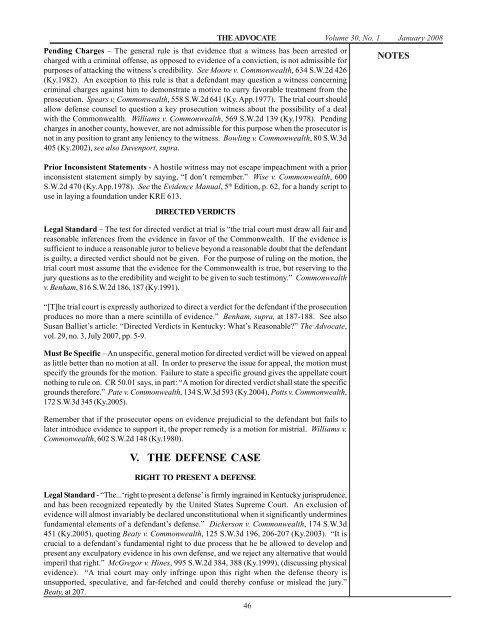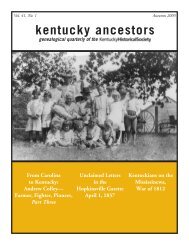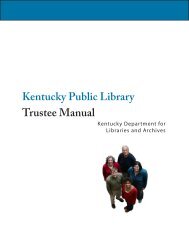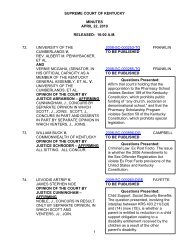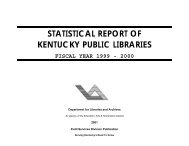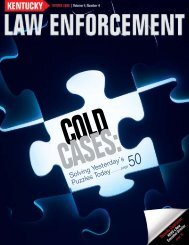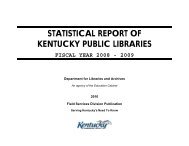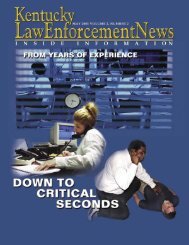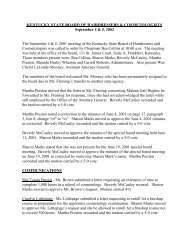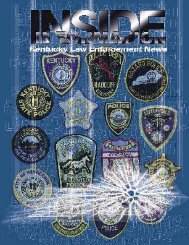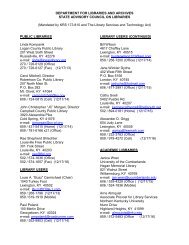Jan08 Advo.pmd - e-archives Home
Jan08 Advo.pmd - e-archives Home
Jan08 Advo.pmd - e-archives Home
You also want an ePaper? Increase the reach of your titles
YUMPU automatically turns print PDFs into web optimized ePapers that Google loves.
THE ADVOCATE Volume 30, No. 1 January 2008<br />
Pending Charges – The general rule is that evidence that a witness has been arrested or<br />
charged with a criminal offense, as opposed to evidence of a conviction, is not admissible for<br />
purposes of attacking the witness’s credibility. See Moore v. Commonwealth, 634 S.W.2d 426<br />
(Ky.1982). An exception to this rule is that a defendant may question a witness concerning<br />
criminal charges against him to demonstrate a motive to curry favorable treatment from the<br />
prosecution. Spears v, Commonwealth, 558 S.W.2d 641 (Ky. App.1977). The trial court should<br />
allow defense counsel to question a key prosecution witness about the possibility of a deal<br />
with the Commonwealth. Williams v. Commonwealth, 569 S.W.2d 139 (Ky.1978). Pending<br />
charges in another county, however, are not admissible for this purpose when the prosecutor is<br />
not in any position to grant any leniency to the witness. Bowling v. Commonwealth, 80 S.W.3d<br />
405 (Ky.2002), see also Davenport, supra.<br />
Prior Inconsistent Statements - A hostile witness may not escape impeachment with a prior<br />
inconsistent statement simply by saying, “I don’t remember.” Wise v. Commonwealth, 600<br />
S.W.2d 470 (Ky.App.1978). See the Evidence Manual, 5 th Edition, p. 62, for a handy script to<br />
use in laying a foundation under KRE 613.<br />
DIRECTED VERDICTS<br />
Legal Standard – The test for directed verdict at trial is “the trial court must draw all fair and<br />
reasonable inferences from the evidence in favor of the Commonwealth. If the evidence is<br />
sufficient to induce a reasonable juror to believe beyond a reasonable doubt that the defendant<br />
is guilty, a directed verdict should not be given. For the purpose of ruling on the motion, the<br />
trial court must assume that the evidence for the Commonwealth is true, but reserving to the<br />
jury questions as to the credibility and weight to be given to such testimony.” Commonwealth<br />
v. Benham, 816 S.W.2d 186, 187 (Ky.1991).<br />
“[T]he trial court is expressly authorized to direct a verdict for the defendant if the prosecution<br />
produces no more than a mere scintilla of evidence.” Benham, supra, at 187-188. See also<br />
Susan Balliet’s article: “Directed Verdicts in Kentucky: What’s Reasonable?” The <strong>Advo</strong>cate,<br />
vol. 29, no. 3, July 2007, pp. 5-9.<br />
Must Be Specific – An unspecific, general motion for directed verdict will be viewed on appeal<br />
as little better than no motion at all. In order to preserve the issue for appeal, the motion must<br />
specify the grounds for the motion. Failure to state a specific ground gives the appellate court<br />
nothing to rule on. CR 50.01 says, in part: “A motion for directed verdict shall state the specific<br />
grounds therefore.” Pate v. Commonwealth, 134 S.W.3d 593 (Ky.2004), Potts v. Commonwealth,<br />
172 S.W.3d 345 (Ky.2005).<br />
Remember that if the prosecutor opens on evidence prejudicial to the defendant but fails to<br />
later introduce evidence to support it, the proper remedy is a motion for mistrial. Williams v.<br />
Commonwealth, 602 S.W.2d 148 (Ky.1980).<br />
V. THE DEFENSE CASE<br />
RIGHT TO PRESENT A DEFENSE<br />
Legal Standard - “The...‘right to present a defense’ is firmly ingrained in Kentucky jurisprudence,<br />
and has been recognized repeatedly by the United States Supreme Court. An exclusion of<br />
evidence will almost invariably be declared unconstitutional when it significantly undermines<br />
fundamental elements of a defendant’s defense.” Dickerson v. Commonwealth, 174 S.W.3d<br />
451 (Ky.2005), quoting Beaty v. Commonwealth, 125 S.W.3d 196, 206-207 (Ky.2003). “It is<br />
crucial to a defendant’s fundamental right to due process that he be allowed to develop and<br />
present any exculpatory evidence in his own defense, and we reject any alternative that would<br />
imperil that right.” McGregor v. Hines, 995 S.W.2d 384, 388 (Ky.1999), (discussing physical<br />
evidence). “A trial court may only infringe upon this right when the defense theory is<br />
unsupported, speculative, and far-fetched and could thereby confuse or mislead the jury.”<br />
Beaty, at 207.<br />
46<br />
NOTES


